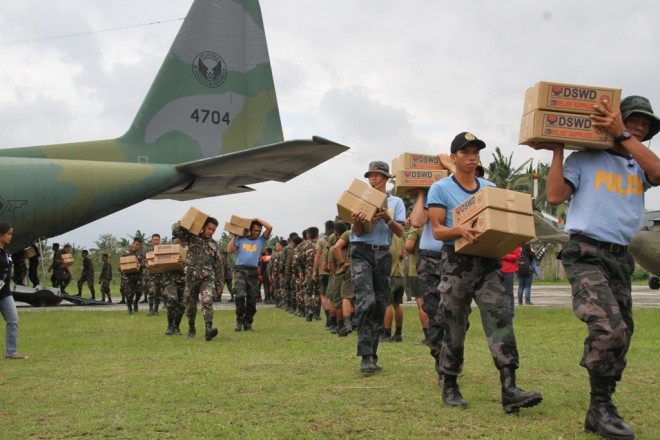
Philippine invention, such as ready-to-eat arroz caldo, would soon make food relief distribution much easier. CONTRIBUTED PHOTO/Philippine Air Force
A ready-to-eat chicken porridge for hungry disaster survivors and an anti-dengue device developed by Filipino scientists have made it to this year’s R&D 100 Awards, also widely known as the “Oscars of Invention,” joining the ranks of highly innovative technologies and services from around the world.
The Department of Science and Technology-Industrial Technology Development Institute’s (DOST-ITDI) “Pack of Hope” Ready-to-Eat Chicken Arroz Caldo and the Philippine Mosquito Ovicidal-Larvicidal Trap System (OL Trap) recently bagged the award under the Process/Prototyping category.
“By becoming an R&D 100 Award Finalist, your institution is now a member of a selected R&D community recognized for their excellent contributions to advancing science and technology,” stated Bea Riemschneider, editorial director of the ABM Science Group of the R&D Magazine, in announcing this year’s winners.
Since 1963, R&D Magazine has annually given recognition to the top 100 innovative technologies of the year through its R&D 100 program. Previous winners have included chemistry breakthroughs, biomedical products, consumer items, sophisticated testing equipment, according to its website.
“Pack of Hope” was developed by DOST-ITDI’s packaging technology division in 2013 to address hunger in disaster-hit areas in the country.
The ready-to-eat meal was designed as a disaster mitigation/relief food that can be promptly distributed to disaster survivors and emergency service responders and providers. Ready to be consumed without preparation straight from the package, it is conveniently packed in an easy-open-stand-up retort pouch.
It has a shelf life of at least a year and its packaging is lightweight, which can withstand harsh conditions during land, sea and aerial distribution. It can withstand an aerial drop of about 800 to 1,000 feet, especially in flooded areas or disaster zones that cannot be accessed by land, according to DOST.
Arroz caldo or rice porridge is a simple hearty dish considered by Filipinos as a “comfort food,” especially for the sick.
The product underwent field testing and validation studies in collaboration with the Department of Social Welfare and Development and various local government units and has been successfully commercialized since three years ago.
Initiated by the DOST-ITDI’s chemical and energy division in 2011, the OL Trap is an anti-dengue contraption that controls and prevents Aedes mosquitoes from developing to the adult stage, which in turn reduces the transmission of the dengue virus.
The trap works by attracting female mosquitoes to lay eggs on the paddle drenched with an organic solution—safe ingredients commonly used for food preparation, which kills the eggs and larvae, preventing mosquitoes from maturing.
The device has since been commercialized and rolled out in households and in public schools nationwide.
This year’s R&D 100 Award winners were recognized in a black-tie dinner in Nov. 3 in Maryland, Washington D.C. The winners were selected by an independent panel of more than 50 judges, representing many of the industry’s leading R&D companies and national laboratories./rga